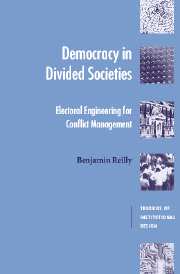Book contents
- Frontmatter
- Contents
- List of illustrations
- List of tables
- Acknowledgements
- List of abbreviations
- 1 Introduction: democracy in divided societies
- 2 The historical development of preferential voting
- 3 Centripetal incentives and political engineering in Australia
- 4 The rise and fall of centripetalism in Papua New Guinea
- 5 Electoral engineering and conflict management in divided societies (I): Fiji and Sri Lanka compared
- 6 Electoral engineering and conflict management in divided societies (II): Northern Ireland, Estonia and beyond
- 7 Technical variations and the theory of preference voting
- 8 Conclusion: assessing the evidence
- References
- Index
5 - Electoral engineering and conflict management in divided societies (I): Fiji and Sri Lanka compared
Published online by Cambridge University Press: 22 September 2009
- Frontmatter
- Contents
- List of illustrations
- List of tables
- Acknowledgements
- List of abbreviations
- 1 Introduction: democracy in divided societies
- 2 The historical development of preferential voting
- 3 Centripetal incentives and political engineering in Australia
- 4 The rise and fall of centripetalism in Papua New Guinea
- 5 Electoral engineering and conflict management in divided societies (I): Fiji and Sri Lanka compared
- 6 Electoral engineering and conflict management in divided societies (II): Northern Ireland, Estonia and beyond
- 7 Technical variations and the theory of preference voting
- 8 Conclusion: assessing the evidence
- References
- Index
Summary
As Chapter 4 has demonstrated, there is evidence that preferential voting, when used in Papua New Guinea's early national elections, encouraged a degree of collaboration and accommodation between rival candidates competing for elected office. However, the circumstances of the Papua New Guinea case are in many ways unique. Papua New Guinea's multitude of ethnic groups are typically small and isolated, with inter-group conflict being manifested at the local level rather than as a contest for state power; the elections in question took place at an early and relatively undeveloped stage of political competition; the electoral process was almost certainly administered more efficiently under the Australian administration than in the post-independence period; and the pervasive influences of colonial rule make it difficult to disentangle just how much of the political behaviour witnessed at these early elections can legitimately be interpreted as a valid response to the system itself as compared to the strictures of the colonial administration. For these reasons, one needs to be cautious in extrapolating too much from the Papua New Guinea example alone.
Unfortunately for comparative purposes, there are relatively few cases of similar electoral arrangements being used over a substantial time period in other ethnically divided societies which could help ascertain whether the apparently moderation-inducing effects of AV in pre-independence Papua New Guinea are likely to be replicable elsewhere.
- Type
- Chapter
- Information
- Democracy in Divided SocietiesElectoral Engineering for Conflict Management, pp. 95 - 128Publisher: Cambridge University PressPrint publication year: 2001



